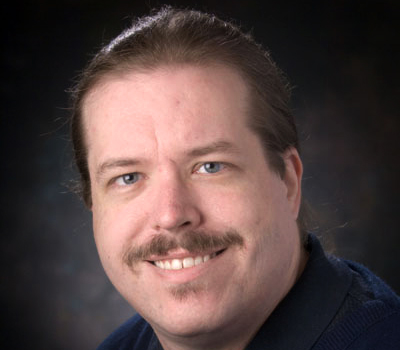Dr. Douglas Clowe uses gravitational lensing to study the basic structure of the universe
We do not know what 95% of the universe is made of however, we do know that somewhere in that 95%, dark matter and dark energy exist. Therefore, it has become of increasing interest for scientists to uncover what the universe is made of and how it has grown and evolved over the past 13 billion years. Dr. Douglas Clowe, of Ohio University, is studying the dark matter and dark energy within the structure of the universe. His primary research focus is in the field of observational cosmology where he uses the tool of gravitational lensing; a process in which massive structures bend, passing light with their gravity to focus the light, similar to a giant magnifying glass.
Using gravitational lensing, Dr. Clowe is able to study both the structure of galaxies and their surrounding dark matter. Distant galaxies are gravitationally lensed by nearby clusters of galaxies, which magnify galaxy populations that would otherwise be too faint to see. Dr. Clowe and his team have already had proven success through their discovery of the Bullet Cluster - consisting of two colliding clusters of galaxies. Understanding the structural mass of these galaxy clusters through gravitational lensing gives us information as to the nature of the dark matter that is holding the clusters together. By studying the relative magnifications of galaxy at different distances behind the cluster, we learn about how the universe is expanding and the dark energy that is driving that expansion. Through gravitational lensing, Dr. Clowe can uncover secrets of dark energy and dark matter. His continued research will focus on trying to improve the way that masses of galaxy clusters are measured, uncovering the acceleration of the rate of expansion of the universe.
Dr. Clowe's current projects include:
-
Merging Clusters of Galaxies: Dr. Clowe uses optical, infrared, and X-ray images to study merging clusters of galaxies. He and his team perform gravitational lensing measurements on the optical and infrared images to measure the location and amount of mass in the clusters. By comparing this with the X-ray images, they have shown that the majority of the mass in these systems must be some type of dark matter, and have placed constraints on both how the dark matter particles can interact with themselves and on any potential deviations on how gravity behaves on million light-year scales. With further work, Dr. Clowe hopes to be able to use this technique to identify what dark matter really is.
-
Improving Measurements with Gravitational Lensing: Dr. Clowe is improving the ability to measure the masses of structures with gravitational lensing, with the goal to improve the accuracy of the techniques sufficiently to allow the mass measurements of clusters in future large surveys (LSST, WFIRST, Euclid) to determine the nature of dark energy, which is the mysterious substance that is causing the universe to accelerate its rate of expansion.
Bio
Dr. Clowe works in the field of observational cosmology, using weak gravitational lensing to study clusters of galaxies and their surrounding medium. The primary goals of his research are to measure the fundamental parameters of the universe, to determine the nature of dark matter and dark energy, and to measure the structural evolution of massive objects in the universe. Other goals of his research include the measurement of the redshift distribution of the faint galaxy population, the luminosity function and spatial distribution of cluster dwarf galaxies, and the evolution of the cluster galaxy population.
Dr. Clowe's work using the "Bullet Cluster,"a merger of two clusters of galaxies, provided the first direct evidence that dark matter must exist independent of any assumptions about how gravity works on cosmic scales.
Dr. Clowe was an undergraduate at California Institute of Technology and earned a Ph.D. from the University of Hawaii. He held postdoctoral positions at the Max Planck Institute for Astrophysics, the University of Bonn, and the University of Arizona before joining the faculty at Ohio University in 2006.
Dr. Clowe has always loved science, with astronomy becoming his greatest love when he got a backyard telescope for Christmas when he was 10. He has since continued to follow his passion for astrophysics working to further develop gravitational lensing as a tool to use to help study the distant universe.
Website: www.phy.ohiou.edu/~clowe
In the News
Harvard Press Room


